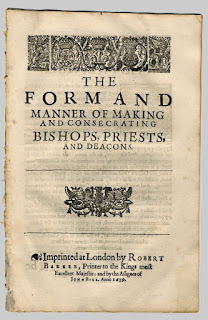"Ordination is instituted by Christ": Bramhall on the grace of holy orders
They teach, that Ordination is a Sacrament; and we do not much oppose it. It is either weakness or frowardness, to wrangle about the name, when men agree upon the thing. We do believe, that Ordination is a sacred rite or action instituted by Christ, wherein, by the imposition of hands, the holy Orders of Bishops, Priests or Presbyters, and Deacons, are conferred ...
Neither do we say this only, but we prove it manifestly. First, by the institution itself; which was most solemnly performed by Christ, and is most punctually related by the Evangelist. There we have the very matter and the very form used by the Church of England; but of their patin or chalice, or the delivery of it, or of their formal words, "Receive power to offer sacrifice for the living and for the dead", of their new matter and new form, not one syllable.
Secondly, we produce the belief and practice of the primitive Church, who knew no other matter than imposition of hands, nor other form than, "Receive the Holy Ghost, whose sins thou dost remit they are remitted" ...
Thirdly, we produce the practice of the Greek and all other Churches which are not of the communion, ever until this day; which would not have failed so universally, so constantly, ever since the beginning of Christianity, in an essential of Ordination. And although the Greeks do not receive this new matter and form, yet the Romanists did never deny them to have true Orders, nor did ever ordain any one again who had formerly been ordained in the Church of Greece. How can they admit the Grecians, wanting their new matter and form, to have holy Orders, and yet for the want of these deny the holy Orders of the Protestants to be valid? ...
Fourthly, we produce a great cloud of witnesses from among themselves, of their choicest scholars, and such as have been most conversant in this question, who deny the delivery of the patin and chalice to be essentials of Ordination.
Lastly, supposing that ceremony to be essential to Ordination, but denying that it is so, yet we have words sufficient in our form to include it; as, "Receive power to exercise the office of a Priest". He that gives the foundation, gives all power pertaining to it. Again, "Receive power to administer the Holy Sacraments". For all the essentials of their Sacrifice are contained in our celebration of the Holy Eucharist; that is, according to their schools, the consecration, and consumption of the whole. Both these we have as well as they: the former more purely than they, the latter more eminently than they; inasmuch as with us both Priest and people do receive, with them the Priest only.




Comments
Post a Comment